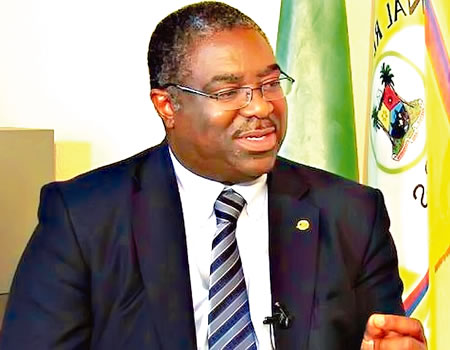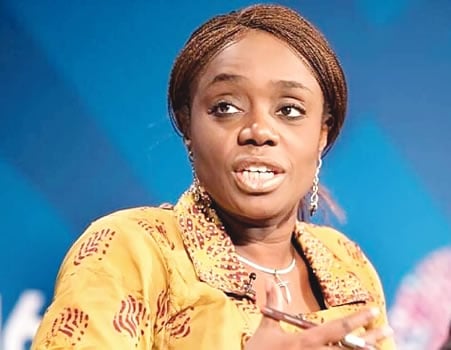
As Nigeria’s tax amnesty ends on Saturday, it has become obvious on the flipside of the coin, that payment of taxes is now a battle between doing what is good and what is evil. Tax avoidance is seen as evil while voluntary payment seen as good. This view was supported by the Minister of Finance, Mrs. Kemi Adeosun in a CNBC Africa interview. She said, Tax evasion is a crime.
“Our focus is getting everybody to do the right thing because these monies were made in Nigeria and it’s only fair and right that some of that money is ploughed back into the system to allow all of us go forward.
“The moral arguments against illicit financial flows and tax evasion and the strong international co-operation are such that every Nigerian tax payer should do the right thing. The needs of our people for development override any other argument against payment of tax,” says Adeosun.
Armageddon is a biblical word, described by Oxford Advanced Learner’s Dictionary as “a battle between good and evil at the end of the world.” It went further to describe Armageddon as “a terrible war that could destroy the world.”
While the end of the world is not here yet, it is only apt to liken the March 31, deadline for Nigeria’s tax amnesty to the end, because of repeated threat by the federal government (FG) to deal with tax evaders. It follows that if the federal government wages war (against evil) to instill right attitude of tax compliance on Nigerians, it would be justifiable.
Mosadoluwa Adeleke, a Lagos-based lawyer supports this view. According to her, this is a good initiative. “It is high time we increased the level of tax consciousness of the Nigerian citizenry and changed the existing tax narrative. This not only boosts revenue but also makes the government accountable to its citizens.”
When the three tiers of government began to feel the hurts of paucity of fund as payment of workers’ salaries and meeting other obligations became increasingly difficult, aggressive funds mobilization became imperative.
This gave birth to the idea of Voluntary Assets and Income Declaration Scheme (VAIDS). The VAIDS initiative is a tax amnesty programme of the Federal Ministry of Finance in collaboration with the Joint Tax Board (JTB) and state revenue agencies. It was launched on 29 June, 2017 via an Executive Order signed by Vice President Yemi Osinbajo. The Federal Government after the launch, recruited and trained 2,190 Community Tax Liaison Officers (CTLOs), under the scheme. A total of 1,710 CTLOs were deployed to 33 states, out of 2,190 tax officers recruited and trained to raise awareness about the scheme and taxation in general.
In terms of applicable taxes affected by the scheme, the disclosure requirements would be in respect of all taxes payable to all levels of government – federal, state and local government taxes including Companies Income Tax, Personal Income Tax, Petroleum Profits Tax, Capital Gains Tax, Stamp Duties, Tertiary Education Tax and Technology Tax.
The tax amnesty is specifically targeted at taxpayers, who have failed to fully declare their taxable income and assets or have not been paying the tax due.
It is also aimed at those who are underpaying or under-remitting; those under a process of tax audit or investigations by tax authorities or are engaged in tax disputes with tax bodies, but are prepared to settle the disputes out of court.
Just five days left before the consequences for defaulting in payments and refusal to declare assets and income begin to apply. At the end of the amnesty window, the FIRS will commence criminal prosecution of tax evaders who do not make use of the opportunity. Interest and penalties on taxes due are 21per cent and 10 per cent respectively.
Non-compliance culture
Before now, tax was treated like a voluntary engagement by a few citizens whose occupation or position imposes inescapable responsibility on them to pay their taxes as and when due. The poor attitude to tax has made Nigeria’s tax-to-GDP ratio one of the lowest globally.
The total working population in Nigeria was 69,470,091 as at Q4 2016, according to the National Bureau of Statistic. This number has risen to about 80 million today. Surprisingly, on March 9 while speaking on a television programme, the Executive Chairman of the Federal Inland Revenue Service revealed that the N20 billion realized from the Voluntary Assets and Income Declaration Scheme (VAIDS) was paid by 262 people.
Just as Adeosun revealed that 94 per cent of those who pay tax in Nigeria, are salary earners, Taiwo Oyedele, a partner and head of tax and regulatory services at a consulting firm, Price Waterhouse Coopers (PwC) Nigeria, and Tax Leader for PwC West Africa added his voice. He said only 14 million people are registered with all 36 tax authorities and the Federal Inland Revenue Service out of almost 80 million workforce in Nigeria. Of the 14 million, 96 per cent are captured through the Pay As You Earn (PAYE) tax system while only four (or 560,000) file returns through direct assessment as self-employed and high networth individuals.
Oyedele further disclosed that within the direct assessment population, only 943 people pay N10 million or more in personal income tax (including 214 who paid N20 million or more), compared to about 950,000 in South Africa. To pay N10 million in income tax, one needs to earn about N50 million annual income (or about N100 million to pay N20 million tax). Nigeria’s PAYE tax revenue is smaller than South Africa’s with less than one-third of Nigeria’s population and higher unemployment rate.
From a PwCWorldbank report in 2017 on ease of paying taxes in Nigeria, it takes 906 hours to comply with 3 main taxes in Nigeria: corporate, consumption and labour taxes.
Similarly, the Lagos Internal Revenue Service (LIRS) Director of Legal Services, Mr Seyi Alade gave his own figures. According to him, the state has an estimated population of 21 million people. But out of that 21 million people, there is another estimated figure of 8 million that are taxable persons.
“Right now, what we have as an agency in our tax net is just five million people. And out of these, there is a lot of non-compliance amongst them.
“It is another thing for you to pay tax; it is another thing to pay adequately. So what the government is really getting right now from the taxes is not sufficient enough,” he said.
Nigeria’s tax to GDP ratio is said to be one of the lowest in the world. It compares poorly with its continental neighbours, Ghana, whose tax-to-GDP ratio is 16 percent; South Africa’s 27 per cent, while Vietnam and Thailand, Nigeria’s MSCI frontier market peers, record 19 per cent and 16.5 per cent respectively.
The need to abandon this old way was instrumental to the birth of VAIDS.
Fate of tax evaders post VAIDS
Any taxpayer who fails to embrace the voluntary disclosure Scheme will be investigated and if found culpable will be prosecuted in addition to full payment of tax due including penalty and interest.
Apart from naming and shaming tax debtors as well as closing their business premises in the case of companies, the Federal Government has warned that those who failed to declare their assets and incomes for tax purposes would regret it.
“If it takes that (prosecution), we have increased our legal fees in our 2018 budget. Every tax defaulter will be prosecuted. People say we should use the 80-20 principle, meaning that we focus on those that give us 80 per cent of their taxes,” the FIRS chairman added.
Confident that “No investor will work with you if they realize you have issues with the Taxman,” Fowler explained that a big taxpayer that might have paid N1billion and because of that feels that FIRS should leave the additional N500million being owed, has got it wrong.
“Somebody who paid N100,000 has paid 100 per cent of his tax liabilities this means he is 100 per cent compliant. The organization that paid N1 billion and still has N500 million left did not fully comply, but only 50 per cent compliant.”
Nigerian Tribune findings revealed that what the FIRS looks at, as tax administrators, is the level of compliance. The government is ready, willing and able to take tough actions against individuals and corporate entities who neglect to take advantage of VAIDS.
For those (‘na who know me’) who still think that they can never be found out, but make use of banks, the tax authorities according to the FIRS boss, are in possession of huge volumes of transaction and financial data obtained from banks, payment platforms and government agencies that will expose such persons and entities.
Like the biblical doubting Thomas, many are still saying that the tax man is joking. A doubting Thomas is a skeptic who refuses to believe without direct personal experience. It is a reference to the Apostle Thomas, who refused to believe that the resurrected Jesus had appeared to the ten other apostles, until he could see and feel the wounds received by Jesus on the cross.
Tax defaulters like Thomas, are perhaps waiting to have personal experience of a hard punch from the taxman before VAIDS could make any meaning to them. Unfortunately, it might be too late to get all the benefits of VAIDS. They don’t know and they do not believe that the FG has voted a bigger sum of money for legal fees in its 2018 budget.
Apart from thinking that FIRS will not find them, the doubters also believe that the government would be fazed by an avalanche of litigation that might arise at the closure of the VAIDS window on March 31.
The Federal Government has warned that it will make life difficult for all tax agents that remained skeptical rather than take advantage of its tax amnesty.
Running from vaids, caught by unique identifiers
Does the tax man know me? Tax investigators, are relying on information derived from Bank Verification Number (BVN), records of property ownership, records of foreign exchange allocation, records of company ownership from the Corporate Affairs Commission (CAC), among others to ascertain the income status of the companies/individuals vis-a-vis their lifestyles
Some beggars according to the minister, are earning millions, and government will even look at their lifestyles and tax them, adding that “even proceeds from begging are taxable. You are supposed to pay taxes even if your means of income is begging.”
On this premise, Mr. Fowler clarifies that, “The income you earn should be taxed and when you invest in property to gain additional income, it should also be taxed. The focus right now is on those that make substantive amount in Nigeria that have not declared or are underpaying their taxes.”
There will be collaboration with foreign governments where assets and illicit funds are likely to be held by Nigerians. Government will leverage on various international agreements including the recently ratified Convention on Mutual Administrative Assistance in Tax Matters which has been signed by over 100 countries.
Three states- Lagos, Osun and Kaduna as well as the Federal Capital Territory (FCT) administration have promised to provide all transaction data required to identify tax defaulters at the expiration of the first phase of the tax amnesty programme in March.
The VAIDS office also said it is equally looking to derive more data from treasury bills, Nigerian Inter-Bank Settlement System (NIBSS), Integrated Payroll and Personnel Information System (IPPIS), Nigerian Civil Aviation Authority (NCAA) and payment platforms such as Remitta.
Another effort that will help the taxman smoke out evaders out is the data mining initiative of the Federal Government. Through the Federal Ministry of Finance, over 130,000 new batch high net worth individuals and companies that have potential tax underpayments have been identified. An analyst rightly asks, “do you know if your name is already there?”
The Minister of Finance, revealed this recently, while appearing on the Good Morning Nigeria programme of the Nigerian Television Authority.
The minister disclosed that the data was currently being compiled by Project Lighthouse in preparation for the closure of the ongoing VAIDS.
Project Lighthouse is a unique project of the Federal Ministry of Finance that combines data from Federal and State agencies and overseas countries.
She said, “The data have been received from a number of sources including land registries of the Governments of Lagos, Kaduna, Kano and Ogun States as well as the Federal Capital Territory.
“Under the exchange of information protocols, this information relates to bank records and financial filings for tax purposes and is obtained from tax havens who are signatories to the information sharing agreements such as British Virgin Islands and Mauritius.”
She explained that the data received from overseas countries would only be used for taxation purposes in line with the protocols governing the exchange of information
Common violations by non-compliant tax payers to include: Under-declaration of and non-declaration of income earned including income from Government contracts and overseas trading; Collection of Value Added Tax (VAT) which is not duly remitted to FIRS; Charging of non-allowable personal expenses to company accounts particularly with reference to overseas school fees; Inconsistency between income declared for tax purposes and the value of assets owned.
It is only advisable for non-compliant tax payers to seek professional advice and to also consult relevant literature available from the tax authorities on tax rules.
Asked if the Federal Government would extend the deadline of the tax amnesty programme, the Minister like Fowler, ruled out an extension of the deadline saying sufficient period had been given to tax payers to voluntarily and truthfully declare their assets and income which had not been declared previously.
On February 3, 2018 the government said some foreign countries, including the United Kingdom Government, have commenced with Nigeria the Automatic Exchange of Tax Information (AETI).
During the presentation of Progress Report on Tax Laws Reform by the Vice Chairman of the National Tax Policy Implementation Committee, Mr Taiwo Oyedele, Adeosun disclosed that Nigeria became a party to the agreement in January 2018.
Stakeholders’ views
Stakeholders and industry experts predict hostile post-VAIDS environment for tax evaders. Other analysts however, argue that permanent solution to Nigeria’s poor voluntary tax compliance culture rests on revamping our obsolete tax laws. “This is more desirable than an executive fiat that gives tax holiday to people as a momentary relief”, said Okeleme who wants VAIDS to play a complementary role to reviewing of our outdated tax laws.
The Director-General, Lagos Chamber of Commerce and Industry (LCCI), Muda Yusuf, had at various fora lamented the infrastructure decay bedeviling our environment. He also expressed concern over the hydra-headed monster called multiple-taxation. This he considered a threat to smooth tax administration. He also drew attention to the closure of many private sector businesses in recent times due to unbearably hostile operating environment.
Analysts argue that tax is an outcome of productive endeavour. Therefore, pursuing VAIDS without a corresponding attention to deteriorating infrastructure, multiple taxation, official extortions and bad leadership with impunity at all tiers of government – which represent a threat to effective role by the factors of production, could lead to passive resistance to VAIDS among Nigeria’s tax payers.
Self-assessment option
While post VAIDS looks uncertain, a herd of tax experts believe that companies and individuals should not wait to see the tax Armageddon or receive any letter from the taxman because, no one fights the government and comes out unscathed. Instead, entities can go back to self-assessment system. An African proverb had it that it is only a tree that remain standing where it is, after being told that it will be cut.
The Constitution of the Federal Republic of Nigeria has provided a leeway for implementation of self-assessment, in section 24 (f), it was stated as follows:-”that it shall be the duty of every citizen to declare his income honestly to appropriate and lawful agencies and pay his tax promptly”
The Nigerian self assessment system requires that:- The taxpayer accurately calculate his tax liability, pay the tax due at designated bank to collect e-ticket and file self-assessment return on or before the statutory(due) date for filing such tax return; Tax returns are accepted, by the tax authority, as filed, subject to on-the-spot simple checks to ensure that tax return forms are correctly completed.
The returns are later subjected to further administrative processing including risk assessment of all tax returns and audit, where necessary, determined by risk-based case selection; Where the taxpayer fails to meet his obligations, late returns penalty and interest imposed, as the case may be.
The tax authority exercises its right under the law by issuing administrative assessments on taxpayers who fail to file tax returns on due date. Information for such assessments are obtained by an on the spot audit of the taxpayer’s records and from third-party sources.
It is noted that ahead of due dates for filing tax returns, taxpayers are reminded about their obligation to file and pay taxes due.
The Tax Authority relies heavily on post-filing controls such as risk-based audits, collection enforcement measures, et cetera to elicit compliance. The filing and payment requirements of the different tax types are discussed as follows;- Taxpayers filing petroleum profits tax returns are expected to do so not later than five months after accounting year end; In the case of companies income tax, returns are due within six months of accounting year end; Tax returns for value added tax are due for filing within twenty-one days following the month in which the transaction was made; and Individuals filing personal income tax returns do so on the 31st of March each year.
CONCLUSION
A summary of the legislation guiding the implementation of the self assessment system in Nigeria are summarised as follows: Constitution of the Federal Republic of Nigeria 201;, Federal Inland Revenue Service (establishment) Act 2007; Tax Administration (Self Assessment) Regulations, 2011; Company Income Tax Act 2007 (Sections 52 (2)and 53); Personal Income Tax Act 2011(Sections 41 and 44); Petroleum Profit Tax Act 2007(Section 30); Value Added Tax Act 2007 (Sections 15 and 16).
The Laws listed above are contained in the Laws of Federation Nigeria (LFN) Revised Edition (Laws of the Federation of Nigeria) Act 2004 Updated to 31st Day of December 2010.
The self-assessment system guarantees payment of taxes due on due date in concurrence with filing of tax returns thus ending the era of bogus ‘’best of judgment assessments”, reduced the accumulation of uncollectable arrears and builds mutual trust/ effective partnership of taxpayers and tax officers.








